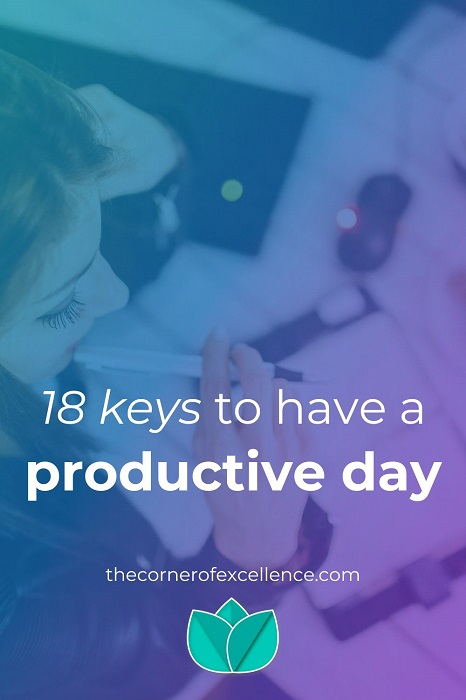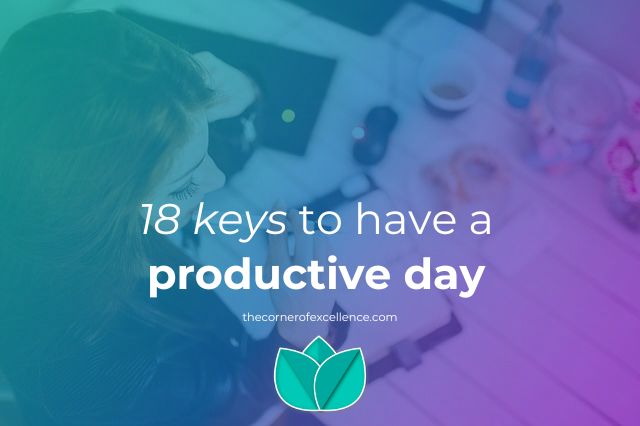How we start our day sets the tone for the rest of it. There are good habits, from the time we get up until the time we go to bed, that help us have a productive day at work and on a personal level. Some habits are paramount. Others are optional but also beneficial. Let us see which they are.
The aspects for a productive day
If you want to improve your work and personal productivity, you need to find a balance between three basic aspects. On the one hand, taking care of yourself is key to having energy. That includes food, physical activity, rest, relationships and fun.
On the other hand, reviewing and planning the tasks to be carried out helps you keep an overview, focus on your priorities and move forward with your goals. According to studies, we are only really productive for about three hours a day. Keep this in mind when planning your day and the number of important tasks that you set for yourself.
Finally, it requires taking care of your work environment so that it encourages your concentration.
Take care of yourself
Taking care of the well-being and health of our body and mind is essential to be productive. This increases your energy, your ability to concentrate and your creativity. Also you and your well-being should be your first priority.
1. Create a healthy morning routine
Eat a healthy breakfast that combines carbohydrates and protein. Include at least one piece of fruit to provide vitamins and fiber.
Before or after breakfast I suggest you take time for contemplation. Meditate or write in your gratitude journal for example. Also activate your body by stretching or exercising.
2. Rest between tasks
Throughout the day, take short breaks after important tasks that require concentration. This helps you to disconnect for a moment from work and lets your mind recover. Make sure they are active breaks. That is, get up to stretch your legs. A short walk or some stretching would be ideal.
3. Take a lunch break
Are you one of those who think they are too busy to take a lunch break? Remember that being busy is not the same as being productive. Even if it is just a half-hour break, getting up from your desk for a change of scenery will help you renew your energy. You will recover that half hour or hour for lunch by far, being more productive later.
Try that the food is not very copious so as not to feel sleepy in the afternoon. Also, include a large serving of vegetables. They will fill you up faster and provide you with essential vitamins.
4. Disconnect from work
At the end of your day, try to leave everything ready to be able to disconnect well. In the next section, we see how to do it. As far as self-care is concerned, try to do activities after work that take your mind off work matters.
Take a walk or practice sports. Hang out with friends. Visit a museum or a concert. Read for a while or do crafts. There are many options. Of course, do not try to do everything every day. Rather distribute over the week the activities that you like.
5. Have a good but light dinner
If you want to take care of yourself, do not skip dinner. Keep in mind that you will spend many hours without eating. It is recommended that dinner be rich in proteins because they are digested more slowly than carbohydrates. There should also be at least two hours between dinner and bedtime. Otherwise, you will have a harder time falling asleep.
6. Sleep well
I think at this point I am not going to tell you anything you do not already know. Sleeping well is essential for our body and mind to recover. Therefore, try to sleep enough hours. At night the brain assimilates the experiences of the day and regenerates. So if you want to be more productive, take care of your sleep.
Review and plan
The second key aspect to having a productive day is, of course, planning. This is the way to not only react to what arises but to be proactive. It means deciding how you want to spend your time.
7. Decide the tasks to tackle
Open your calendar and to-do list to remind yourself of your plan for the day (more on this in point 13). Which are the most urgent important tasks to tackle? If there are other tasks that seem urgent but not that important, assess the real urgency and whether you can delegate them.
8. Start with the most important and urgent task
It is time to get down to work and tackle the most important and urgent task. If it takes more than a few minutes, take a short break afterwards.
9. Check your email
Ideally, do not check email until you have finished the most important and urgent task of the day. There are jobs where this is not an option because the workload depends a lot on the superior. In this case, reviewing the email would go before the decision on the tasks to be undertaken in order to take into account what may require immediate attention.
But if this is not your case, you will find that you will be much more productive if you first dedicate time to an important task. Then, as I said, check and clean your inbox. Respond to all emails that can be answered quickly. Mark for follow-up those that require preparation to reply them. Write down in your list, all the tasks that arise from the emails. And, of course, take the opportunity to eliminate all spam.
I suggest that you try not to spend more than 15 minutes (maximum half an hour if the volume of emails is very high) reviewing your inbox.
10. Get on with what is important
Then, if you do not have meetings, move on to important but not urgent tasks that will pay off later. These are usually priority tasks related to projects or goals.
11. Tackle the rest of issues and tasks
Once you have finished working on the important tasks you had planned for the day, resolve other matters by order of urgency. Also check your email again and answer what is needed, what was pending from the morning or what required preparation and that you have already done.
However, do not pretend to finish everything pending. Prioritise and focus on what is absolutely necessary.
12. Check what you achieved
At the end of the day, take a few minutes to review what you have accomplished. Congratulate yourself on your achievements and be proud. This way you will feel satisfied and stay motivated.
13. Plan the next day
With your agenda, project list and to-do list in front of you, first decide what the most important tasks are for the next day. On the one hand, keep in mind the deadlines that the tasks have. On the other hand, consider how long it takes you to do them or how much time you want to spend moving forward on tasks that cannot be finished in a day. I suggest that you choose no more than three important tasks.
As I mentioned before, our ability to focus and be productive is limited. In addition, other urgent matters that may arise, answering emails and calls, attending meetings and performing other lower priority but necessary tasks, will also require time. If you are too ambitious you will end up frustrated if you do not manage to do everything planned. So be realistic when deciding your tasks.
It can help to set aside time in your calendar to focus on important tasks. Then also write down on your list other less important tasks that you must do the next day.
14. Consider your most productive hours
As much as possible, I suggest you keep your most productive hours in mind when scheduling your tasks and meetings. Try to reserve your most productive hours for important tasks that require a lot of concentration.
If possible, schedule meetings (except very important ones) during your least productive hours. The ideal is to try to concentrate the meetings at certain times of the day in order to keep your agenda clear the rest of the time for your important tasks. It can also be a good idea to have at least one day a week without meetings. If feasible, pick a fixed day that you try not to have meetings on.
15. Do not be discouraged by the unforeseen
There are days when your whole plan falls apart. Unforeseen events arise that seem to require your immediate attention. If this happens, do not get discouraged or frustrated. Take a moment to assess the real urgency of the contingency.
Do you really have to stop what you are doing to take care of it right away? Is it more important and urgent? What can happen if you do not attend to the unforeseen issue immediately? Try to ask for the deadline if they do not indicate it and you are not sure. Urgent might actually mean for the next day or for the afternoon, not right now.
In any case, it is advisable to remain flexible in planning in order to be able to adapt to circumstances and possible changes in priorities. I also mentioned before that you should not be too ambitious in your planning, precisely because of the unforeseen events that may arise.
Take care of your environment
The third aspect to take care of in order to have a productive day is your surroundings. Let us look at some key points.
16. Keep order
A messy room and desk distract you. To be more productive you need to be able to concentrate well. So try to have on your desk only what you really need.
At the end of the day I recommend that you collect everything and leave your desk clear.
17. Mute your phone
Unless you need to be available for calls, the best thing for a productive day is to put your mobile phone on silent. If that is not feasible, I suggest muting it for at least a little while, while you work on your most important tasks. Imagine that you are in a meeting with yourself. If you were in a meeting you would also mute your phone.
In fact, if you have set aside time in your calendar to work on your most important tasks, to others, who may check your availability, you will appear to be in a meeting.
Beyond muting calls, if even for a little while, I suggest deactivating app notifications. In the posts about distractions and digital detox I tell you the benefits.
18. Eliminate distractions and interruptions
Finally, to work focused and thus have a productive day, try to eliminate two of the biggest time thieves. Manage the interruptions that you may suffer and eliminate distractions, starting with the smartphone as mentioned in the previous point.
Do you find it difficult to have a productive day?
Is it hard for you to be as productive as you would like? Which is the reason? What can you do to improve your productivity? Which of the tips do you think will help you the most?

Sharing is caring!




